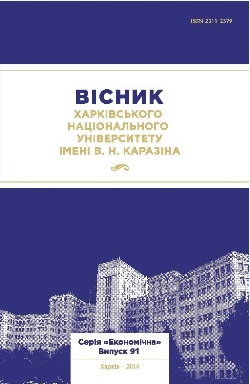Trust and socio-economic development: cluster analysis of parameter interdependencies
Abstract
The article focuses on the detection and analysis of the interdependencies between socio-economic indicators (GDP per capita, human development index HDI) and indices of interpersonal and institutional trust. We consider the following key issues: a review of definitions and indicators of trust; calculation of indices of interpersonal and institutional trust (which is represented by the trust to the government) based on international surveys; cluster analysis of the relationship between indices of trust and GDP and HDI indicators (by a sample of world countries).
There are similarities between definitions of interpersonal trust and the ability to operationalize this concept, presenting it in the form of quantitative indicators. The definition of institutional trust is not of an operational nature. Trust to institutions corresponds to the degree of satisfaction of people’s expectations about these institutes. However, the evaluation of the institution reflects people’s attitude to the agents of these institutions, thus satisfaction from a particular institution is the comprehensive result of the efficiency assessment of such relations and the activities performed by the agents of these institutions.
Based on the calculated indices of interpersonal trust and trust to the government we show that Ukraine is a country with an average interpersonal trust and a weak trust to the government. The study of relationships between the indices of trust indicators and GDP per capita and the human development index (HDI) was conducted using cluster analysis. The results of the analysis give grounds to conclude that in countries with high level of socio-economic development (GDP per capita and HDI) the level of interpersonal trust and trust to the government is also high. Nevertheless, in medium and low values of the parameters analyzed there was no certain dependency between the trust and the aforementioned socio-economical indices.Downloads
References
Rousseau D. M. Not so different after all: A cross-disciplineview of trust / D. M. Rousseau, S. B. Sitkin, R. S. Burt, C. Camerer // Academy Manag. – 1998. − Rev. 23, 3, − P. 393–404.
March S. P. Formalising trust as a computational concept / S. P. March. - University of Stirling. − 1994. – 184 p.
Mui L. Computational models of trust and reputation: Agents, evolutionary games, and social networks / L. Mui. − Massachusetts Institute of Technology. − 2003. – 139 p.
Ruohomaa S. Trust management survey / S. Ruohomaa, L. Kutvonen // Journal of Trust Management. – 2005. – P. 77-92.
Moreland D. A snapshot of trusted personal devices applicable to transaction processing / D. Moreland, S. Nepal, H. Hwang, J. Zic // Personal Ubiq. Comput. − 2010. – Vol. 14. − № 4. –
P. 347–361.
Dumouchel P. Trust as an action. Euro / P. Dumouchel. − J. Sociol. – 2005. − № 46. – P. 417–428.
Sztompka P. Trust: A Sociological Theory / P. Sztompka. − Cambridge University Press. − 1999. – 214 p.
Molm L. D. Risk and trust in social exchange: An experimental test of a classical proposition / L. D. Molm, N. Takahashi, G. Peterson // Amer. J. Sociol. – 2000. − No. 5 (105). – P. 1396–1427.
Cook K. S. Trust building via risk taking: A cross-societal experiment / K. S. Cook, T. Yamagishi, C. Cheshire, R. Cooper, M. Matsuda, R. Mashima // Social Psychol. Quart. – 2005. − No. 2 (68). – P. 121–142.
Lewis J. D. Trust as a social reality / J. D. Lewis, A. Weigert // Social Forces. – 1985. – Vol. 63. − № 4. – P. 967–985.
Меркулова Т. В. Экспериментальный и социологический методы измерения доверия /
Т. В. Меркулова // Наукові праці Донецького національного технічного університету. Сер.: Економічна. – 2014. − № 1. – С. 139-148.
Ostrom E. A Behavioral Approach to the Rational Choice Theory of Collective Action: Presidential Address, American Political Science Association / E. Ostrom. − The American Political Science Review. – 1997. – №1. – Р. 1–22.
Gambetta D. Trust. Making and breaking cooperative relations. / D. Gambetta. – Cambridge, Massachusetts. −1988. – 261 р.
Naef M. Measuring Trust: Experiments and Surveys in Contrast and Combination / M. Naef,
J. Shupp // IZA Discussion Paper № 4087 - 2009. – 167 p.
Trust data [Electronic resource]. – Accessed mode : http://www.worldvaluessurvey.org/wvs.jsp.
Trust data [Electronic resource]. – Accessed mode : http://www.europeansocialsurvey.org/.
Trust data [Electronic resource]. – Accessed mode : http://www.globalbarometer.net/.
Trust data [Electronic resource]. – Accessed mode : www.latinobarometro.org/.
Trust data [Electronic resource]. – Accessed mode : www.asianbarometer.org/.
GDP per capita data [Electronic resource]. – Accessed mode : http://data.worldbank.org/indicator/NY.GDP.PCAP.PP.CD.
HDI data [Electronic resource]. – Accessed mode : http://gtmarket.ru/.

